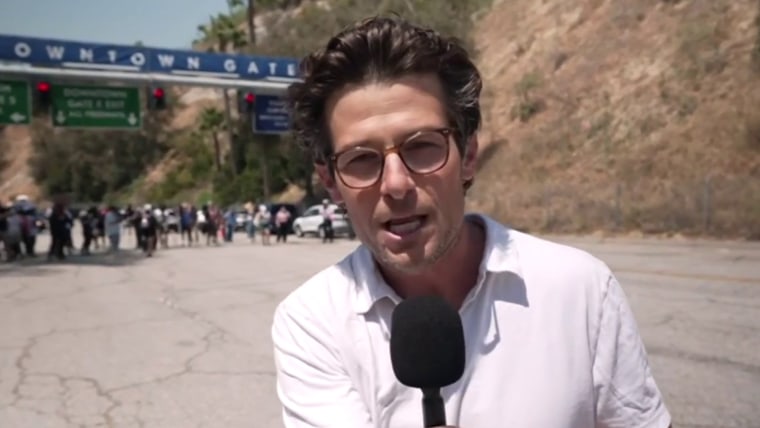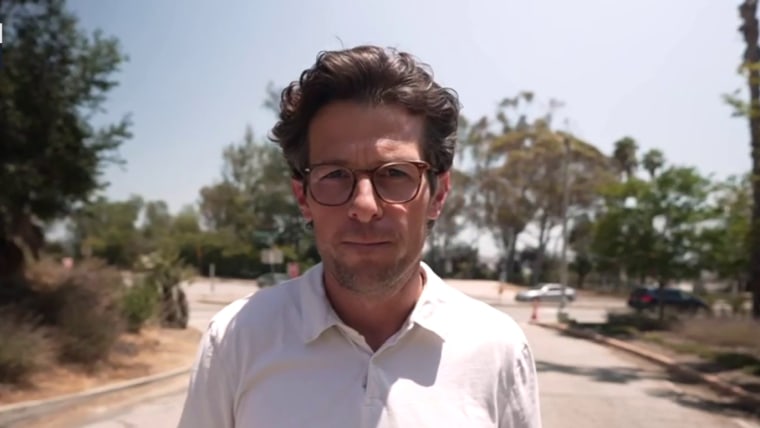Before the Los Angeles Dodgers’ June 14 home game against the San Francisco Giants, Dominican American singer Nezza performed — defiantly, she said — “El Pendón Estrellado,” a Spanish-language rendition of the “Star-Spangled Banner.” She said a team official explicitly demanded that she perform the national anthem in English but that she refused. (The Dodgers did not release a statement regarding Nezza’s performance or confirm her story that she violated the team’s wishes.)
Dodgers, your silence speaks volumes. The Latino community of Los Angeles has shown up for the Dodgers. Where are you now that we need you?”
A tuesday editorial in CALÓ News
Nezza’s performance, a protest against what Immigration and Customs Enforcement has been doing in Los Angeles, arose out of her imagining her parents “being ripped away from me,” she said. Not surprisingly, Nezza’s performance was polarizing, with some cheering and others expressing outrage. Among the responses was an editorial from CALÓ News demanding that the Dodgers support a community under attack from the federal government.
“Dodgers, your silence speaks volumes,” CALÓ News wrote Tuesday. “The Latino community of Los Angeles has shown up for the Dodgers. Where are you now that we need you?”
That question seems to have been answered Thursday when the team announced that it had turned away ICE agents who had attempted to enter Dodger Stadium’s parking lot. “They were denied entry to the grounds by the organization,” the team wrote on X.
ICE, also in a post on X, called the Dodgers’ claim “false,” and Homeland Security Assistant Secretary Tricia McLaughlin told NBC News that “this had nothing to do with the Dodgers,” and that Customs and Border Protection vehicles (CBP) “were in the stadium parking lot very briefly, unrelated to any operation or enforcement.”
Whatever happened in the Dodger Stadium parking lot will continue to be dissected by anti-ICE protesters and MAGA supporters, but it’s clear that the Dodgers, accused of a silence that amounted to betrayal in the CALÓ News editorial, could no longer stay quiet. For a team whose main fan base is Latino and for a league that continues to thrive because of Latin American and Caribbean players, what the Dodgers did Thursday needs to cascade throughout all of MLB. A league with so many prominent Latino players needs to speak up, now more than ever.
Before the parking lot incident, one of the Dodgers’ veterans had already expressed outrage at what he’d been seeing. On Instagram, Kiké Hernández, the Dodgers’ veteran infielder, who’s from Puerto Rico, wrote in part, “this city adopted me as one of their own. I am saddened and infuriated by what’s happening in our country and our city ... And I cannot stand to see our community being violated, profiled, abused and ripped apart. ALL people deserve to be treated with respect, dignity and human rights.”
I cannot stand to see our community being violated, profiled, abused and ripped apart. ALL people deserve to be treated with respect, dignity and human rights.
Kiké Hernández, the Dodgers’ veteran infielder on instagram
The Dodgers first order of business after moving from Brooklyn in the 1950s was forcibly evicting the predominantly Mexican American neighborhoods in Chavez Ravine. Originally designated for public housing, the land was ultimately given to Dodgers owner Walter O’Malley to build the stadium. Families saw their homes bulldozed on live television, leaving a legacy of pain and mistrust that still plays a role in the community’s view of the team today.
While Black Americans have long celebrated the Dodgers for drafting Jackie Robinson and breaking the color line in the MLB, the Latino community, as Eric Avila, professor of Chicano Studies and History at UCLA, has said, remembers “the legacy of conflict upon which Dodger Stadium was built.”
Some healing began in the 1980s when Mexican pitcher Fernando Valenzuela and “Fernandomania” took over Los Angeles and professional baseball. Known as “El Toro de Etchohuaquila,” Valenzuela, who passed away last year at 63, became a symbol of hope and pride and exemplified the potential of a relationship between the Dodgers and the Latino community. As a Puerto Rican kid, Fernando’s rise was one of the first times I experienced a cultural bond with Latinos outside my own heritage, and many Latinos feel a deep connection to the Dodgers, even if they grew up far from Los Angeles.

True solidarity requires more than words. It requires showing up before protests swell and headlines demand answers. It means standing with immigrant families living in fear, supporting organizations on the front lines. If the Dodgers want to show such solidarity, then they need to use the Dodgers’ platform to amplify the voices of those targeted by federal enforcement.
If the Latino community senses that Thursday’s post on X was a mere PR move or a damage control effort, then the outrage at the organization — some of which has been brewing since the World Series champions visited the White House in April — will only intensify. It is imperative that the team take a side as a matter of justice and exhibit loyalty to the people who have made the Dodgers a beloved institution. The fight for immigrant rights is a fight for the soul of this city and this team.
So the Dodgers indeed have a choice. They can be on the right side of history or lose the trust of their most loyal fans, the same Latino fans who have given the Dodgers generations of devotion. The people who helped this team thrive deserved to see the team turning ICE away. May the Dodgers’ expressions of solidarity not end there.

